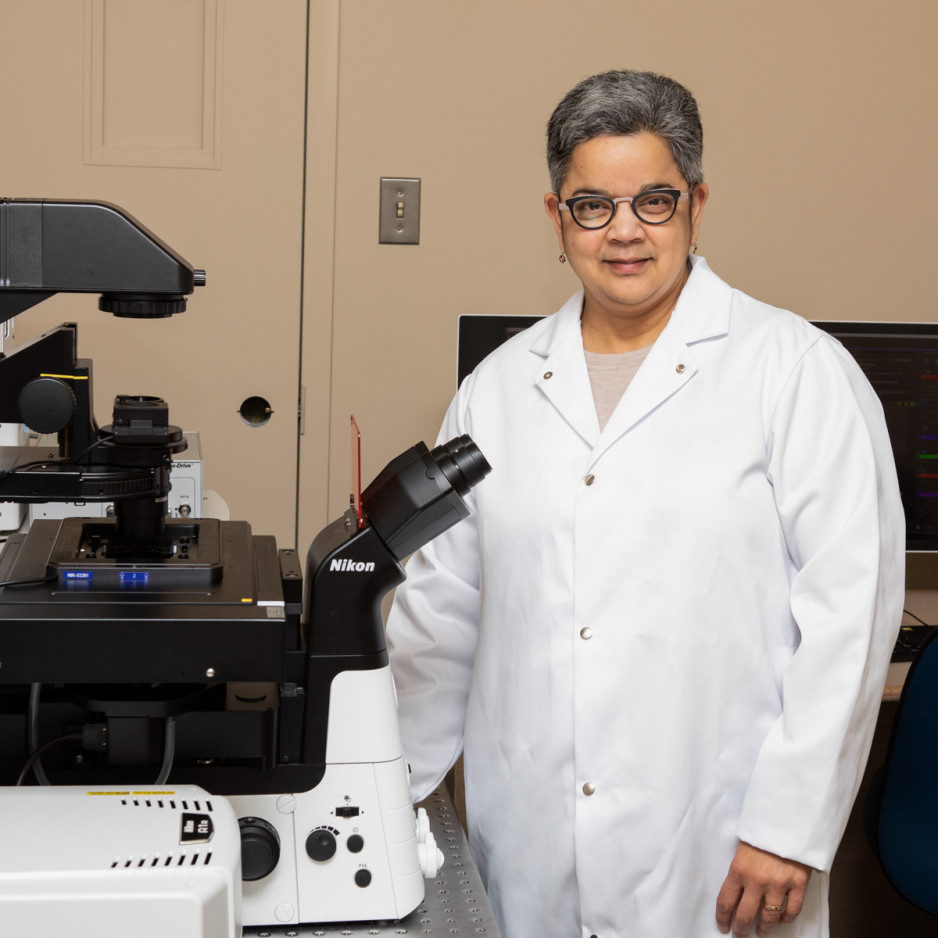Exploring the future of diabetes care
It’s only fitting that some of the biggest breakthroughs in diabetes research continue to happen in London, Ontario – the birthplace of insulin. On October 31, 1920, Sir Frederick Banting woke up in the middle of the night with an idea that led to the discovery of insulin, from his home at the time on Adelaide Street.
Today, insulin is the lifeline for people living with diabetes, particularly those with type 1 diabetes. There’s an estimated 5,883,000 people in Canada with a diagnosis of diabetes, including type 1, type 2, and many others who haven’t been diagnosed yet. The chronic disease is a heavy weight on the health care system, but also on each person battling it on their own.
St. Joseph’s care teams and researchers know that diabetes care is so much more than needles and diet. Managing the disease and maintaining good overall health takes time, focus and bravery – not to mention access to treatments, tools, support and education. It can lead to a cascade of complications, like heart and kidney disease, blindness and amputation.
But as the prevalence of diabetes rises, research is giving us plenty of reasons to be hopeful. And donors are fueling this important work through their generosity and vision. Right now, teams at St. Joseph’s Lawson Research Institute are studying diabetes at the cellular level and leading quality improvement initiatives to enhance the delivery of care for patients.
Lighting Up Basic Science: Savita Dhanvantari, PhD
Studies of living cells, right in the lab, are the foundation of scientific discovery. Savita Dhanvantari has dedicated her career to studying how cells and hormones interact to address the many unanswered questions about diabetes.
Science has always played a big role in her life. “My dad was a scientist and he cultivated that curiosity in me,” she shares. “Even at a very young age, I enjoyed going to the backyard and mucking around in the garden. My mother was always horrified and thought a girl shouldn’t be doing that sort of stuff. But my dad always encouraged curiosity.”
During her Masters and PhD training, she became fascinated by the way different parts of the body talk to each through hormones and set out to learn more about their role in chronic diseases. When she joined Lawson, she started collaborating with imaging researchers – and a new field of study was born.
“Our lab takes the approach that diabetes is a disease of more than one hormone,” Dhanvantari says. It’s believed that diabetes is the result of not only a deficiency of insulin, but also excess secretion of the hormone glucagon. Working as a mentor with several students, Dhanvantari is using high-resolution microscopes to study proteins inside pancreatic alpha cells to see if it’s possible to control the secretion of glucagon.
Right now, they are now the only research group in the world studying a novel protein that is only found in glucagon-secreting cells. Endowed funds through St. Joseph’s Health Care Foundation have been vital to sustaining this research. Some of the lab’s future projects include a study at the cellular level of the role cannabis plays in glucagon secretion.
This work would not be possible without access to the confocal microscope – a donor-funded piece of laboratory equipment that lights up structures inside cells in vivid colours. This tool has made it possible for clinicians and scientists to work together to address questions in disease progression and treatment.
“Donor support has been hugely important,” Dhanvantari says. “It’s hard to convince someone to help fund a microscope that we’re using to study tiny cellular events that may eventually lead to a new treatment. But I think the donors understand the value of basic science discoveries that then feed into a pipeline of clinical care.”
Connecting Diabetes and Kidney Care: Dr. Kristin Clemens
Diabetes management requires a lot of time and support. So does advanced kidney disease, which can be a complication of diabetes. Some people with both diseases need hemodialysis treatments multiple times a week, causing their diabetes management to fall by the wayside.
Dr. Kristin Clemens, endocrinologist and clinician scientist, set out to find new ways to personalize and streamline care for people with diabetes who also have kidney disease. She’s committed to improving care and innovating for underserved groups who aren’t always included in research studies, like people with complex medical conditions, women, new immigrants and people without a family doctor.
“When I first started my practice, I had the chance to start treating people balancing kidney disease and diabetes,” Dr. Clemens says of what inspired her focus. “Right away I recognized how many challenges there were for this population – not only for trying to appropriately manage blood sugars, but also their personal challenges and difficulties navigating the health care system.”
Dr. Clemens and her research team embarked on a patient-oriented study with people receiving care through St. Joseph’s diabetes program to better understand the gaps in the system and identify supports that could improve patient outcomes, enhance the delivery of care and reduce health disparities.
This led to the creation of an outreach program connecting diabetes and kidney care. In this two-year program, a certified diabetes educator (CDE) was brought on-site to London Health Science Centre’s Kidney Care Centre to provide management, support and care for people with diabetes while receiving hemodialysis treatments. The project was funded by generous donations through St. Joseph’s Health Care Foundation.
In total, 58 patients were able to benefit from this all-in-one care model. The CDE helped patients gain confidence in self-managing their blood sugars and provided education and support on nutrition, eye health, heart health, foot care and mental wellness. They also shared knowledge about diabetes management with the kidney care team to help them better support each patient as a whole and sustain the program’s impact long term.
Dr. Clemens hopes that this study is just the beginning of a shift in diabetes care across the country. “I hope that these initiatives will help Canadians access better care and have better outcomes. Working directly with patients with diabetes from different demographics, backgrounds and experiences can lead to improved models of care for all people with diabetes and address some of the health disparities that persist.”
Your Donation Matters Here
Your gift will support vital equipment that will fuel diabetes research at St. Joseph's.

